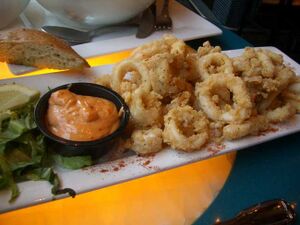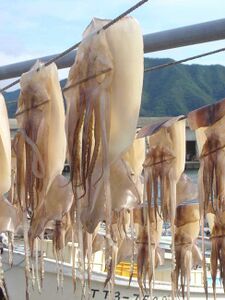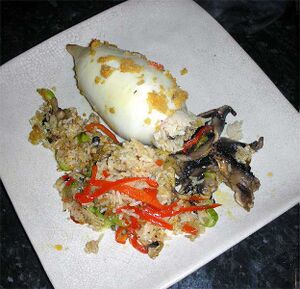Squid
Squid are marine cephalopods of the order Teuthida, which comprises around 300 species. Like all other cephalopods, squid have a distinct head, bilateral symmetry, a mantle, and arms. Squid have eight arms and two tentacles arranged in pairs.
Squid is a popular food in many parts of the world. In many of the European languages around the Mediterranean, squid is called 'calamari' (singular 'calamaro'), which in English has become a culinary name for Mediterranean dishes involving squid, especially fried squid ('fried calamari'). ]
Fried squid
Fried squid, often called 'fried calamari' or even just 'calamari', is popular in the cuisine of many Mediterranean countries. It consists of batter-coated, deep fried squid, often fried for less than two minutes to prevent it from becoming too tough. It is usually served plain, with salt and lemon on the side.
In North America, it is a staple in many Greek, Italian, and seafood restaurants, as well as a snack at some bars. It is often served as an appetiser or starter, garnished with parsley, or occasionally sprinkled lightly with parmesan cheese. It is usually served with a dip of some sort, most often mayonnaise, tzatziki, or in the United States, marinara sauce. In Mexico it is often served with Tabasco sauce or habanero. Other dips, such as ketchup, aioli, or olive oil, are sometimes served as well. Like many seafood dishes, it is usually served with a slice of lemon.
-
Fried calamari
-
Squid drying on the beach in Japan
-
Breaded calamari: Grilled and breaded squid stuffed with vegetable and rice
In Australia, fried calamari is a common and popular menu item in fish and chip shops.
In Chinese cuisine, the squid is often diced, coated in a salt and pepper batter and served with a spicy hot garnishing of chili and salt.
Worldwide
The body can be stuffed whole, cut into flat pieces or sliced into rings. The arms, tentacles and ink are also edible; in fact, the only part of the squid that is not eaten is its beak and gladius (pen).
There are many ways in which squid is eaten worldwide.
- In Italy, Turkey and Greece, squid rings and arms are often coated in batter and fried in oil. Other recipes from these regions feature squid (or octopus) simmered slowly, often with tomatoes. When frying, the squid flesh is kept tender by keeping the cooking time as short as possible. When simmering, the flesh is most tender when the cooking time is prolonged and reduced in temperature.
- In Spain a similar recipe Calamares a la romana, (battered calamari, roman-style calamari) has the calamari rings covered in a much thicker batter, deep fried and accompanied with lemon juice and mayonnaise or garlic mayonnaise.
- Also in Spain, cooked in its own black ink (Calamares en su tinta).
- In the Philippines squid is most often cooked as adobong pusit, squid in adobo sauce, along with the ink, so it resembles the spanish calamares en su tinta, but with a tangier flavour, especially when fresh chillies are added. In restaurants, the common style is battered calamari served with aioli, mayonnaise or chilli vinegar. In casual bars, beer gardens and on the beaches, squid is grilled on coals, brushed with a soy sauce-based marinade, and sometimes stuffed with a tomato-onion filling.
- In Korea, live squid is freshly taken from a tank, killed, cleaned and served quickly. Unlike octopus served in a similar fashion however, squid tentacles do not usually continue to move for long enough to reach the dinner table. The squid is served with wasabi/soy sauce, chili pepper sauce or sesame oil with salt and often wrapped in lettuce or pillard leaves.
- In the Mediterranean, squid or cuttlefish ink is eaten in a variety of dishes such as paella, risotto, soups and pasta; Spaghetti al Nero di Seppia (cuttlefish) being an example.
- In Croatia squid are often eaten grilled and stuffed with pršut and cheese, accompanied by blitva (Swiss chard)
- Seafood stews often contain squid.
- In Chinese and Southeast Asian cuisine, squid is a common ingredient in a variety of dishes such as stir fries, rice and noodle dishes. It is often heavily spiced.
- Whole grilled squid is a common food item in Asia; they are popular at food stalls in China, Thailand, Japan and Taiwan. In Sardinia they are accompanied by a sauce made from lemon, garlic, parsley, and olive oil.
- Pre-packaged Dried Shredded Squid or cuttlefish are popular snack items in Hong Kong, Taiwan, Japan, Russia, and most other former USSR regions mostly sold in a shredded form due to its chewiness.
- Squid is a common sushi and sashimi item.
- In Japan and Korea, squid (usually Firefly Squid or Spear Squid) is often made into shiokara (in Japanese) or jeotgal (in Korean). Heavily salted squid is left to ferment, sometimes with its innards, for up to a month, and is sold in small jars. This salty, strong flavoured item is served in small quantities as banchan, or an accompaniment to white rice or alcoholic drinks.
- In Korea, dried squid is also a popular accompaniment for alcoholic beverages, called anju. Dried squid is often served with peanuts. Squid is also served roasted, with hot pepper paste and/or mayonnaise as a dip sauce. Steamed squid, or boiled squid, is also a delicacy.
- In Turkey, it can be an ingredient in dolma.
- In India and Sri Lanka, squid or cuttlefish is popular in coastal areas mainly in Tamilnadu and in Kerala. Squid are often eaten as deep fried or squid gravy. In Tamilnadu, squid are often called kanava or kadamba.
Seasonal Information: Squid
This information is specifically for countries in the northern temperate zone of the Northern Hemisphere; particularly the United Kingdom, however it should be applicable for northern USA, northern Europe, Canada, Russia, etc.
Squid is at its best and in season during the following months: September, October & November.
Find recipes that contain 'Squid'
#squid #mayonnaise #deepfried #octopus #rice #oliveoil #batter #aioli #parsley #lemon #dip


